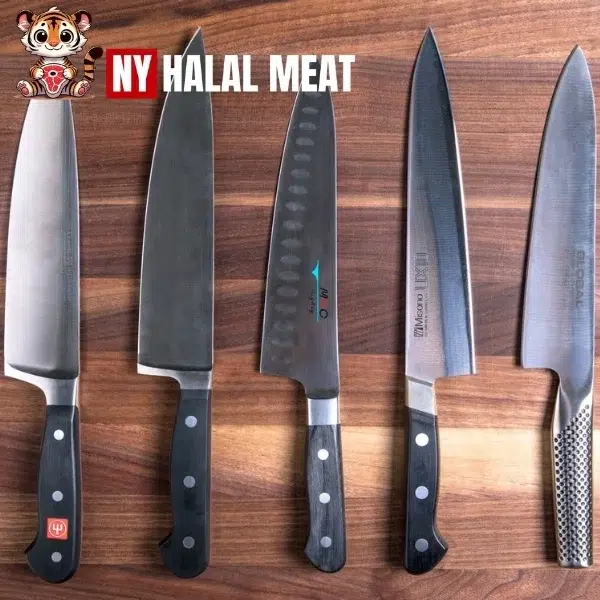Essential Knife Features for Halal Meat Slaughtering
What is Halal Slaughtering?
Halal slaughtering, or “Dhabihah,” follows humane and ethical practices prescribed by Islamic law. The process requires a single, swift motion to minimize the animal’s suffering. Key aspects include:
- The animal must be healthy at the time of slaughter.
- The name of Allah (Bismillah) must be invoked before the act.
- Blood must be completely drained from the animal’s body.
Using a suitable knife is critical to carrying out these requirements efficiently and compassionately.
Key Features of a Halal Slaughtering Knife
1. Sharpness
The knife must be exceptionally sharp to ensure:
- A quick and clean cut that minimizes the animal’s pain.
- Efficient severing of the jugular veins, windpipe, and carotid arteries in a single motion.
- Prevention of unnecessary stress to the animal caused by repeated cutting attempts.
2. Size and Length
The knife’s size must suit the animal being slaughtered:
- For small animals like poultry, a shorter knife suffices.
- For larger animals such as cattle or sheep, a longer knife is necessary to ensure a single, clean stroke.
This ensures the blade effectively covers the required cutting area.
3. Material
The knife should be made from high-quality materials to maintain sharpness and durability:
- Stainless steel is preferred for its resistance to rust and ease of cleaning.
- The blade must be non-porous to prevent bacteria buildup, ensuring hygiene during the process.
4. Handle Design
The handle should provide a secure and comfortable grip to prevent accidents and enhance precision:
- Non-slip handles made from rubber or textured materials are ideal.
- Ergonomic designs reduce hand fatigue, especially when slaughtering larger animals.
5. Cleanliness
Maintaining cleanliness is essential:
- The knife must be thoroughly cleaned before and after each use.
- Residual blood or tissue on the blade can contaminate the meat and violate halal principles.
Additional Considerations for Halal Knives
Regular Maintenance
The blade must be regularly sharpened to maintain effectiveness. A dull knife increases the risk of improper cuts, which can invalidate the halal process.
Separate Use
The knife used for halal slaughtering should not be used for non-halal purposes to prevent cross-contamination. It should be stored separately to ensure its sanctity and readiness for use.
Certification
Some manufacturers produce knives specifically designed and certified for halal slaughtering. Choosing these knives can ensure compliance with Islamic guidelines.
The Importance of the Right Knife in Halal Slaughtering

Using the correct knife is more than a technical requirement; it reflects the ethical and spiritual values underlying halal practices. A well-designed knife contributes to:
- Humane treatment of animals by reducing their suffering.
- Compliance with Islamic principles, ensuring the meat is lawful for consumption.
- Efficient and hygienic processing, benefiting both producers and consumers.
Conclusion
The knife used in halal slaughtering is a vital tool that directly impacts the process’s efficiency, humanity, and adherence to Islamic law. Ensuring the knife is sharp, appropriately sized, durable, and clean allows those performing halal slaughter to honor the ethical and spiritual values it represents. Whether for small-scale use or commercial meat production, investing in a high-quality, purpose-designed knife is essential for meeting halal standards.


